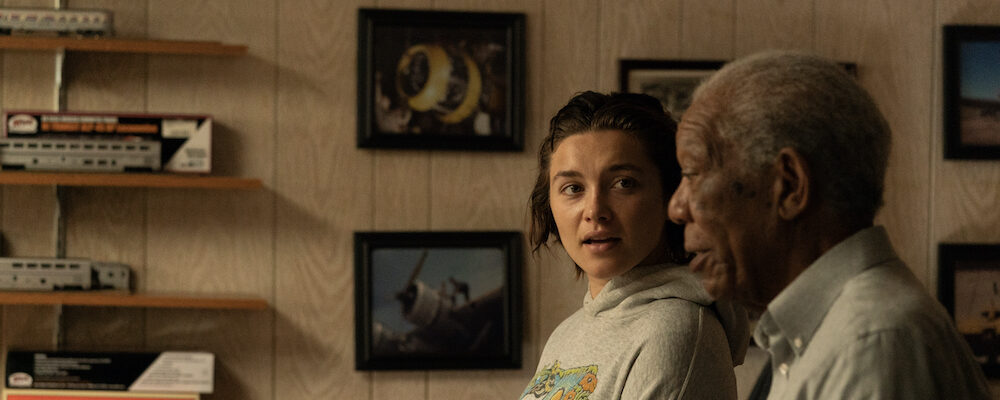‘A Good Person’ Mixes a Powerful Performance From Florence Pugh With Addiction Clichés
Alci Rengifo
A skilled actor can still shine amid a sea of familiar or even contrived material. Zach Braff’s “A Good Person” has such good intentions and a strong cast that for many moments, we can look past its faults. For those familiar with Braff’s style, “A Good Person” actually represents growth in his storytelling. The actor-director gained renown in the 2000s as an indie darling, with a debut that is now looked at with a much more critical eye by a shifted culture. In many ways, “A Good Person” is also a zeitgeist piece, tapping into our current obsession with new forms of angst, guilt and addiction. Here, suburban pain becomes believable through Florence Pugh, who summons a wrenching portrait of tortured guilt.
The opening of the story is quite common in movie land. Ally (Pugh) is happily engaged to Nathan (Chinaza Uche) in one of those picture-perfect millennial relationships. They live in New Jersey and all seems fine, even if Nathan’s father, Daniel (Morgan Freeman), remains at a curious distance. Life brutally intervenes when Allison has a horrible car accident while driving Nathan’s sister and her husband around. Ally is the only survivor of the tragedy. Cut to a year later and the couple have separated. Daniel has custody of Nathan’s surviving niece, Ryan (Celeste O’Connor), who channels her frustrations over losing a mother by rebelling at school. Ally lives with her own mother, Diane (Molly Shannon), and has become a pill junkie. The motivator of her addiction is of course the unbearable guilt she carries, with no way of knowing how to surpass it.
As a filmmaker, Braff has been intrigued since his twenties with the quirks and follies of people. His 2004 debut, “Garden State,” after being initially praised, now finds scorn for having established the template of the “Manic Pixie Dream Girl,” as first embodied by Natalie Portman in the film. Portman’s performance is still kind of lovable, even if it’s pure male gaze delusion. Is Braff responding to his own creation by writing an alternate in Ally? Still working within the clichés of melodrama, Ally feels more truthful and real. She’s wrecked emotionally and continuously tells herself the accident wasn’t her fault. Self-medication numbs the pain. How the accident unfolded is one of Braff’s sharper, more challenging aspects of his screenplay. We see that in the moment when Ally became distracted in checking a phone map. She had no way of knowing a backhoe would suddenly pull back in her lane, but she shouldn’t have taken her eyes off the road. Were the resulting deaths then truly her fault? And if they were, how should she live with it? In a movie full of easy twists, Braff avoids pretending to give easy answers.
Individual scenes work very well next to the obvious attempts at tear-jerking. A moment when Ally goes to a bar in the middle of the day seeking alcohol, where she bumps into two old high school classmates, now addicts themselves, begins with effective eeriness then turns into something subtle and sad. An AA meeting culminating with Ally describing her plight has real power in Pugh’s delivery. Earlier, she arrives at a meeting and is shocked to find Daniel, who we learn is a recovering alcoholic who was once a notorious, violently drunk cop when younger. We’re not surprised to know he blamed Ally for the death of his daughter. Connecting with Ryan will also be difficult, since she also hates Ally and has built a loud, defensive wall around her feelings. Narratively there’s much promise all around, though Braff would rather settle for feel-good resolutions and commentary. Morgan Freeman has cute “grandpa moments” with Ryan, including kicking out an older boy he catches in her bed and attending soccer games.
Later on Ally and Ryan will begin to click and attend a concert together. There will be naïve attempts to reunite the tortured addict with Nathan. A smarter angle is in how Daniel isn’t seeking a new buddy in Ally, but wants to help her, even if he can stumble because of his own faults. Praff can’t help going for corniness with some of the material. Indeed, the movie almost threatens to derail in the third act with quick developments based on ridiculous coincidences. When Daniel does decide to hit the bottle again, the following confrontation involving everyone feels much too calculated, threatening to simply become unreal. Yet Pugh manages to pull through it all with sincerity. Braff throws in the usual montages of pills being drunk, sweaty foreheads and screaming parents. Despite that, Pugh’s tears feel all too real. The director also continues to have a knack for melancholic suburbia needle drops, such as “Wake Up With the Sun” by Odessa, set to images of middle class sunniness. You can never get the aughts indie spirit out of an aughts indie filmmaker.
Yet we truly feel it on screen when Pugh brings the character to life. Morgan, as well, makes his grandfather into a convincing personality who can become unlikable in a switch. There’s good chemistry between the two actors that can feel mature beyond some of the story’s twists. And while Braff has yet to make his magnum opus, a lesser director would be forever stuck in their own narrative clichés. He has obviously moved on from depressed 26-year-old men who find salvation in quirky female fantasy figures. One senses he has seen much more since “Garden State” and its follow-ups. Now he wants to tackle a different kind of longing when it’s about more than finding a girlfriend or a job. This time it is about moments and actions we wish we could run away from but can’t. “A Good Person” even has a calculated title, but with Pugh there’s still some heart in there that gets through.
“A Good Person” releases March 24 in select theaters and expands March 30 nationwide.

